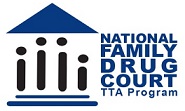
Sponsoring Organization: National Family Drug Court Training and Technical Assistance Program
There’s more to sustained recovery than negative drug tests, treatment attendance, and completion of services. Still, child welfare case plans and FTC phase structures typically focus on acute, clinical interventions that families must complete prior to reunification, graduation, and/or case closure. While more concrete, this approach can prepare families for graduation instead of lifelong recovery.
By assessing a parent’s recovery capital, or “the sum of personal and social resources at one’s disposal for managing drug dependence and bolstering one’s capacity and opportunities for recovery”, teams can identify and incorporate opportunities for children, parents, and families to weave healthy, pro-social behaviors, relationships, and activities into treatment plans, phase structures, and aftercare plans. By adding these opportunities throughout the FTC process, families can also build up protective factors, or strengths that help buffer and support families. The process creates a pathway for sustained recovery, family wellness, SUD prevention and harm reduction, and permanency after case closure.
This Practice Academy course provides FTC teams with information about recovery capital and protective factors and offers strategies to teams that wish to build upon these concepts to promote sustained recovery, child safety, and family wellness. This course will highlight FTCs that integrate recovery capital and protective factor approaches into their phase structures, as well as teams that help create a community that is welcoming and supportive of people seeking recovery.
